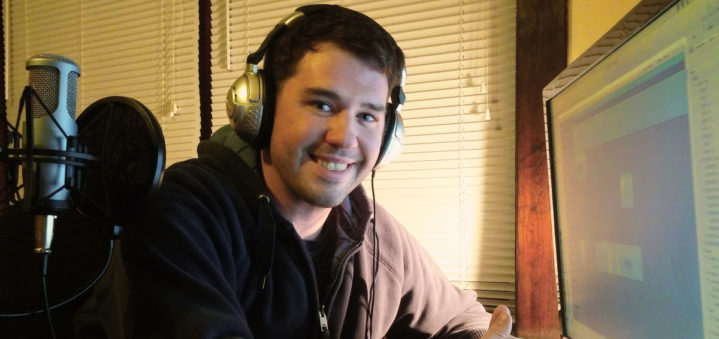
Disrupting Planetary Exploration with John Richter
Before explorers can go somewhere new, they have to plan how they’ll get there and understand what will happen when they arrive. With Transmissions from Colony One, John Richter is using podcasts and radio drama production to help us all understand what a journey of the human race to Mars will be like.

What is Transmissions from Colony One?
Transmissions is an audio drama series about the first manned mission to colonize Mars, with a crew on a one-way trip. As they’re struggling to survive there, they also have to deal with leaving behind everything on Earth, too. Then, an unexpected catastrophe adds more tension.
It was going to be a comic book series, but there were financial constraints and I’m not an artist. Some friends in LA had just produced a comedic murder mystery podcast called Murder on Skull Drive, and when I heard it, I realized Transmissions could be an audio story instead.
What’s your role?
I’m the writer, director and producer. I do all the sound effects, sound design, music, marketing, distribution and some small voice parts. Basically I do everything except the main character voices. I have recorded 50 or so actors from St. Louis, LA, Europe, Asia and all over. The main cast is 15-16 people, including people I went to school with at Webster University, or from local theater companies.
“The Martian” was a huge hit this year. What did you think of it?
I loved the movie. I had a brief correspondence on Facebook with Andy Weir, author of the book when I first heard about it. I like how it portrays Mars exploration as not really futuristic, just current. I enjoyed the hell out of it.
What has Transmissions led you to understand?
The characters in Transmissions were sent to Mars to terraform the planet—engineer a whole planet for habitation. Over the course of the series, I’ve started asking why we wouldn’t fix Earth first.
Unless we get to the point where Earth is doomed because of what we’ve done to it, why would we change Mars before we fixed Earth?
How do the episodes get conceived and produced?
I started researching this two years before recording anything. I’ve talked to NASA, ESA and all kinds of other experts to get all the background info and data to make the series work. The basic storyline is already established, so right now I’m working on character and plot development for the fourth and final season.
What kind of audience and support do you have?
I track about 150 downloads a day to over 120 countries. The Regional Arts Commission awarded me a grant last year, but Transmissions is a labor of love. I make my living as a video production specialist for STL TV, and do some freelance work as well.
Tell us about the picture you sent for use with this story—where did you take it, what’s in the shot, what’s interesting to you about it?
That’s me at home where I work, with the mic I record most people with. Onscreen is the climactic scene from season 3 open in Logic Pro. I had probably 500 or 600 sound effects open at one time for a 20-second scene. A lot of work for a short moment.
How, when or where do you do your best work?
I usually work in the evening or night, mostly by myself. It’s kind of hard to have others work with you on audio mixing once the recording is done.
Beyond education and training, what prepared you for what you’re doing now?
Before college, I always thought I would be a zoologist, I was taking a ton of science. I realized along the way that I was doing all this writing on the side, and that with those projects, even though they had science to them, I really liked the storytelling best.
What tools can you not live without?
For all the St. Louis based actors, I have them come over to my house, where I record them one at a time on Logic Pro with a single mic.
For people outside St. Louis, I might send them a microphone, or I might record them on their own recording device through a Skype session while I record.
Who else’s work do you admire and why?
The main reason I got into my line of work was for filmmaking. I admire Vince Gilligan for the story and characters he creates, the dedication that he has to letting the characters lead the story.
Chuck Jones encapsulated everything I believe in in storytelling, execution. Beautiful pacing.
Chuck’s autobiography “Chuck Amuck” is a delight to read, not just about his life, but the aesthetics of animation and filmmaking. He never takes himself too seriously, every page of the book is part of a flipbook.
How you would describe your POV on the world?
No matter what anyone believes, whatever day we’re living will never happen again. Make the most of it because you’ll never get it back.
How can people follow you?
I’m @mecti1 on Twitter, or they can follow Transmissions from Colony One on Facebook.





